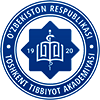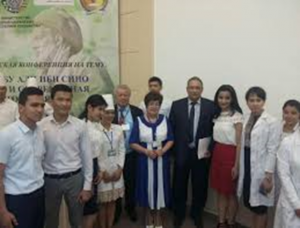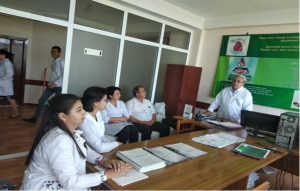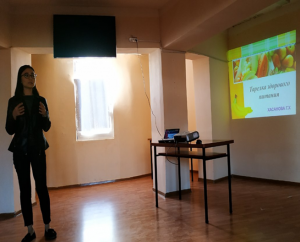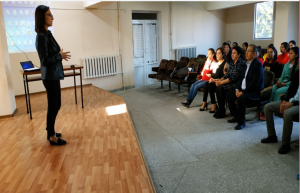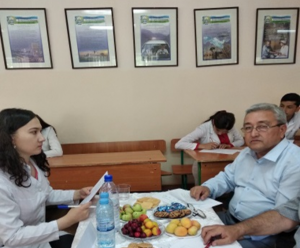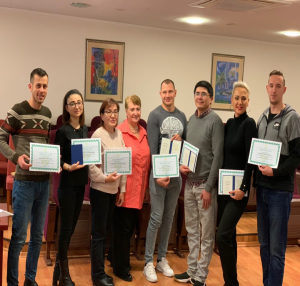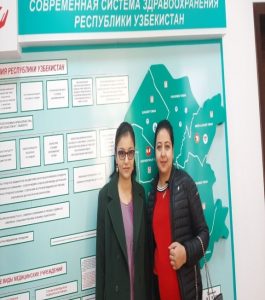
Tashkent medical Academy
Department of propaedeutics of internal diseases No. 1
Master’s degree in Dietology”


Salikhov Mirilxam
Director of the program and moderator of the master’s program “Dietology”.
Organization of master’s degree programs:
In accordance with the decree of the Cabinet of Ministers of the Republic of Uzbekistan dated April 25, 2013 No. 102 “on further improvement of measures for healthy nutrition of the population of the Republic of Uzbekistan”, the concept of healthy nutrition of the Cabinet of Ministers (2015) which considers the role and tasks of dietitians in world medicine and based on these standards, a master’s degree program for training dietitians in the Tashkent Medical Academy on the basis of the Department of propaedeutics of internal diseases No. 1 was created.
The history of the organization of the judiciary – Magistracy specialists and clinical nutritionists are functioning from 2016 at the Department of propaedeutics of internal diseases № 1 of Tashkent Medical Academy. Before setting up a master’s degree in dietetics, trained specialists made sure that dietary meals were prepared the same for each type of illness in the hospital’s food unit, according to Pevsner’s current diet. As a rule, specialists who graduated from the faculty of preventive medicine as nutritionists worked in food units. Currently, graduates of medical Universities who have graduated from the medical-pedagogical and medical faculties are accepted for the master’s program. A specialist dietitian should be able to make an individual menu of dietary nutrition for patients with a diagnosis, metabolic disorders in the body and an individual menu of rational nutrition for healthy individuals, taking into account their particular profession, age, gender, and daily energy consumption.
Goal master’s degree program
The goal is to train masters in the preparation of scientifically based diets for individual patients with prescribed surgical or conservative therapy, with acute and chronic diseases of therapeutic and preventive health care links and individual menu of rational nutrition for healthy individuals taking into account their specific profession, age, gender, daily energy consumption.
Nutritionists can work: in scientific departments of the Academy of Sciences of the Republic of Uzbekistan; in Republican research institutes; in medical institutions and sanatoriums of the Ministry of health of the Republic of Uzbekistan; and also provide training and retraining of medical personnel in institutions of higher and secondary special and professional education of the Republic of Uzbekistan; They can perform such tasks as the organization of dietary nutrition treatment systems and related issues in national, regional, city, district public and private hospitals, sanatoriums and organizations “Uzbekistan Havo Yullari”, “Uzbekistan Temir Yullari”, etc.
Activity: Since the beginning of the master’s program in dietetics at the Department of propaedeutics of internal diseases No. 1 TMA two-year curriculum for training a dietitian graduated two masters, this academic year one graduate, three are first-year students.
When teaching masters in clinics with various pathologies from the aspect of dietetics, it is important to master the scientifically based use of diets increases the effectiveness of treating patients with medications to correct metabolic disorders. For theoretical training of masters, there is a database of educational literature and teaching AIDS in the TMA library and at the Department. you can also use the TMA virtual library.
Seminars
Seminars are held twice a week in accordance with the calendar thematic plan. When developing the topic, we consider the theoretical information collected by the master, and the acquisition of theoretical knowledge through the use of modern pedagogical technologies (test tasks, conceptual table, cluster, pyramid, swot). Since the beginning of the school year, the masters begin learning the basics of dietetics and nutrition. Masters study clinical information in the field of nutrition, based on the knowledge and skills of the bachelor’s degree, and acquire practical skills in clinical bases and laboratories under the supervision of a moderator.
Scientific and practical work (rotation)
Rotation is carried out in accordance with the thematic schedule of the master’s program on the basis of contracts concluded at the beginning of the academic year with clinical bases and laboratories, in order to learn and practice practical skills.
Work with patients in the departments of the clinic for master dietitians involves participation in General clinical examinations, in the preparation and distribution of food, and also includes special dietary examinations, anthropometric examinations of patients, interpretation of laboratory analyses and instrumental examination data.
Scientific and pedagogical activity
One of the main goals of the master’s program is to train teaching staff who are familiar with the organization of the educational process and work with students. For the purpose of evaluating the master’s knowledge and skills, it includes the ability to explain relevant topics using pedagogical technologies, organizational skills, and the ability to use pedagogical teaching methods.
Classes on dissertation work
At the beginning of the academic year, masters will choose the topic of their master’s thesis with a moderator. Topic of master thesis and supervisor discuss the staff of the Department on the Cathedral Council and the problem Commission of TMA, is then submitted for discussion at the scientific Council of TMA. The master of science on the approved topic makes a personal research plan of work together with the head of scientific work. The master conducts research work and based on the results of it drains scientific publications. The task of scientific research is to conduct statistical analysis, publish and summarize the results of research conducted in accordance with an individual plan, and prepare the results for master’s work. At the end of the master’s degree, the master’s thesis is defended.
Distribution of master’s thesis topics from 2016-2019


